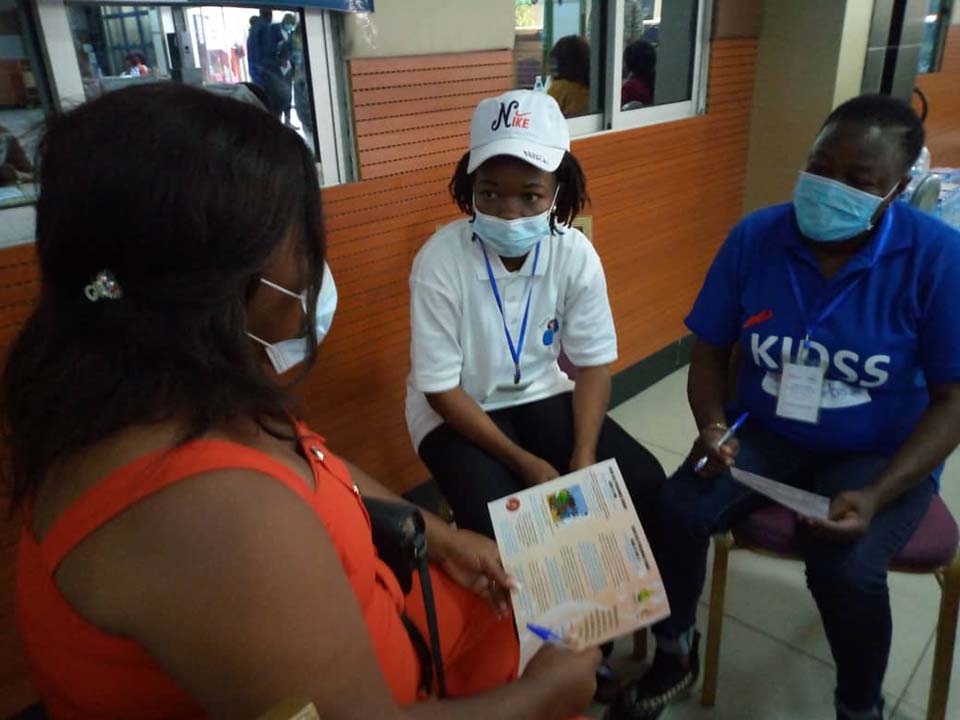
Helping Children With HIV Thrive In Cameroon
Remembering to take daily medications can be hard for many people. But imagine being a young child and having to remember to take pills each day, every day and always at the same time. This is what Martha,* now age 15, has had to do for the past nine years. Diagnosed with HIV shortly after birth, she has been taking lifesaving antiretroviral medications for most of her life.
When she was younger, she had the support of her mother, who used to bring her to the hospital to pick up her medicine and help administer them to her. But when her mother passed away in 2012, Martha was essentially left on her own to follow her treatment regime. She had little help from her father, who also has HIV, but had previously lapsed in his treatment.
A short time after her mother’s death, Martha stopped taking her medications.

Caseworkers from KIDSS and staff members from the health facility where Martha goes for her medication and support, meet to discuss a case.
Photo by AFASO staff for CRS
Then in early 2021, Martha met caseworkers from the Key Interventions to Develop Systems and Services for Orphans and Vulnerable Children, or KIDSS project, and enrolled as a participant. KIDSS is implemented by Catholic Relief Services and its local partner, the National Episcopal Conference of Cameroon, as well as 26 other local organizations throughout 66 health districts across all 10 regions of Cameroon.
Through a comprehensive and coordinated approach, KIDSS helps Cameroon achieve HIV epidemic control and reduce the impact and transmission of HIV. The project includes strengthening the capacity of the government, communities, families and health providers to improve care and support services for orphans and vulnerable children affected by HIV. Its goals include reducing mortality rates and improving the overall well-being of people living with HIV. It also provides families access to care and support services and improves their financial stability.
As part of the KIDSS approach, children living with HIV and AIDS benefit from what’s called enhanced adherence counseling. This includes caseworkers holding meetings and discussions with participants with high levels of HIV in their system to address treatment challenges and failures, as well as to plan and monitor their health and other issues related to their care.
After being enrolled in the KIDSS project, Martha resumed taking her medications, but it still was not easy. Her adherence to the medication schedule did not improve and her viral load went up.
Caseworkers from the local partner Association des Femmes Active et Solidaires found that Martha lacked support from her family. She would often forget to take her medications at the appointed time because she was busy with other activities, such as school and housework. And, when she was feeling healthy, she would skip her treatments, despite understanding that they are vital to her health.
Partner staff helped Martha adjust the time she takes her medications to just before bedtime. They also encouraged her father and younger sister to remind her to take them each evening. Twice a month, caseworkers check in on Martha to monitor how well she follows her medication schedule, including counting pills to ensure she hasn’t missed treatments and addressing any concerns she might have.
Since these counseling sessions, Martha’s adherence to the treatment program has greatly improved.
“I am happy as I am no longer sick as before, and my father now helps me get to the hospital every time I need to refill my medications,” Martha says. “I take my medication regularly and sometimes together with my dad.”
As a result, the amount of HIV in Martha’s blood—known as her viral load—has decreased to a very low level. If this good progress continues, Martha’s viral load could soon become so low that it doesn’t show up in standard lab tests, allowing her to live a long and healthy life.
First started in 2014, the KIDSS program currently provides services to more than 60,000 people with HIV and AIDS across 66 health districts in Cameroon. This includes 60,000 children and adolescents and their families in 16,000 households that receive direct support, including access to pediatric prevention and HIV Testing Services for children and adolescents. The project provides HIV care, treatment and support services to children and adolescents with HIV. It also includes microfinance activities, school placement and scholarships, support for early child development, and positive parenting. KIDSS is funded by the President’s Emergency Plan for AIDS Relief and the United States Agency for International Development.
*Name changed to protect identity

